The Intel Kaby Lake-X i7 7740X and i5 7640X Review: The New Single-Threaded Champion, OC to 5GHz
by Ian Cutress on July 24, 2017 8:30 AM EST- Posted in
- CPUs
- Intel
- Kaby Lake
- X299
- Basin Falls
- Kaby Lake-X
- i7-7740X
- i5-7640X
Civilization 6
First up in our CPU gaming tests is Civilization 6. Originally penned by Sid Meier and his team, the Civ series of turn-based strategy games are a cult classic, and many an excuse for an all-nighter trying to get Gandhi to declare war on you due to an integer overflow. Truth be told I never actually played the first version, but every edition from the second to the sixth, including the fourth as voiced by the late Leonard Nimoy, it a game that is easy to pick up, but hard to master.
Benchmarking Civilization has always been somewhat of an oxymoron – for a turn based strategy game, the frame rate is not necessarily the important thing here and even in the right mood, something as low as 5 frames per second can be enough. With Civilization 6 however, Firaxis went hardcore on visual fidelity, trying to pull you into the game. As a result, Civilization can taxing on graphics and CPUs as we crank up the details, especially in DirectX 12.
Perhaps a more poignant benchmark would be during the late game, when in the older versions of Civilization it could take 20 minutes to cycle around the AI players before the human regained control. The new version of Civilization has an integrated ‘AI Benchmark’, although it is not currently part of our benchmark portfolio yet, due to technical reasons which we are trying to solve. Instead, we run the graphics test, which provides an example of a mid-game setup at our settings.
At both 1920x1080 and 4K resolutions, we run the same settings. Civilization 6 has sliders for MSAA, Performance Impact and Memory Impact. The latter two refer to detail and texture size respectively, and are rated between 0 (lowest) to 5 (extreme). We run our Civ6 benchmark in position four for performance (ultra) and 0 on memory, with MSAA set to 2x.
For reviews where we include 8K and 16K benchmarks (Civ6 allows us to benchmark extreme resolutions on any monitor) on our GTX 1080, we run the 8K tests similar to the 4K tests, but the 16K tests are set to the lowest option for Performance.
For all our results, we show the average frame rate at 1080p first. Mouse over the other graphs underneath to see 99th percentile frame rates and 'Time Under' graphs, as well as results for other resolutions. All of our benchmark results can also be found in our benchmark engine, Bench.
MSI GTX 1080 Gaming 8G Performance
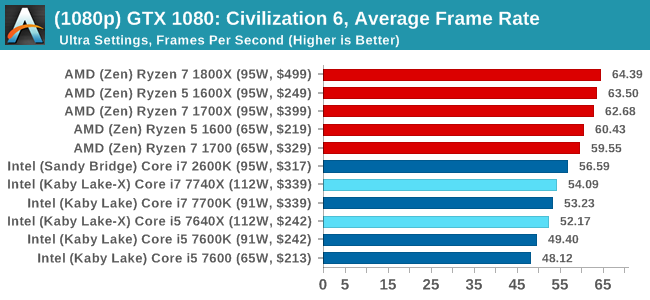
1080p

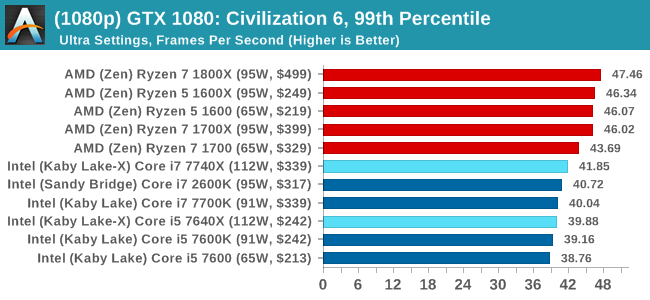
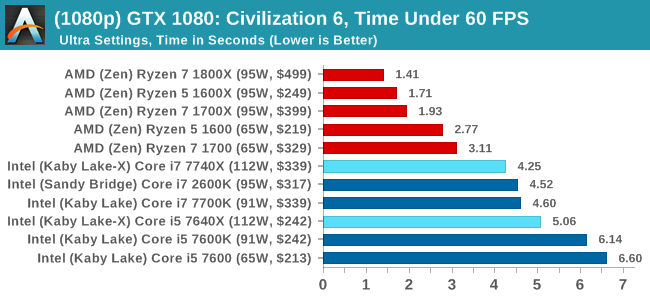
4K
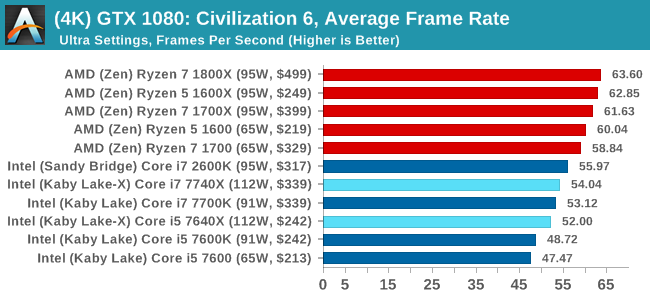
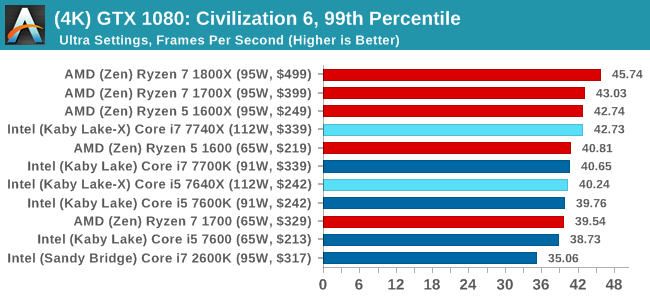
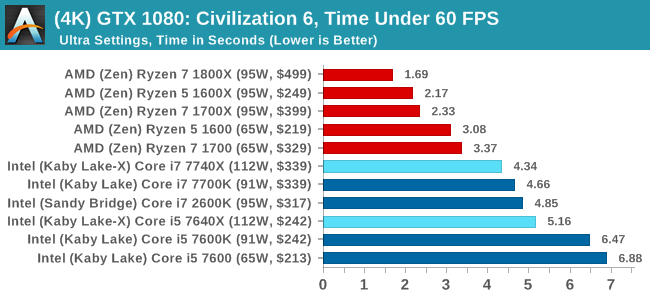
8K
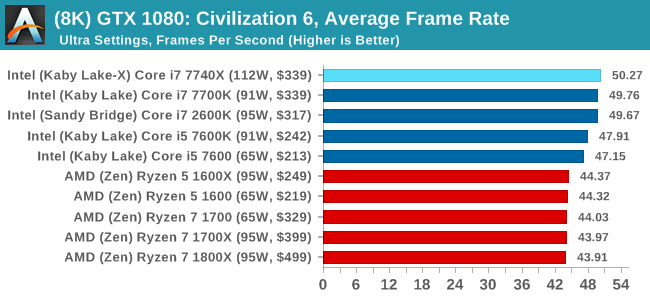
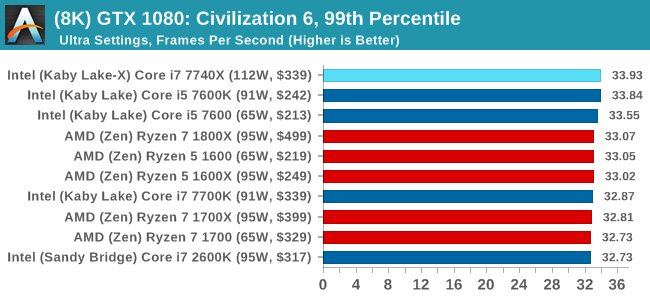
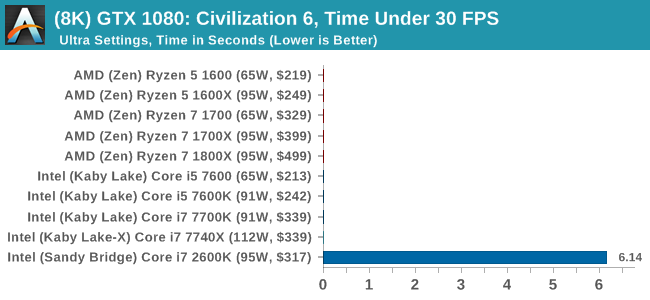
16K
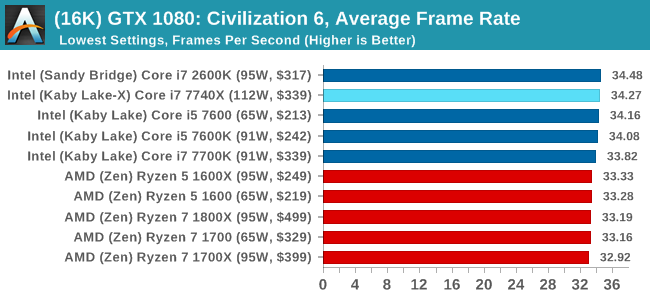
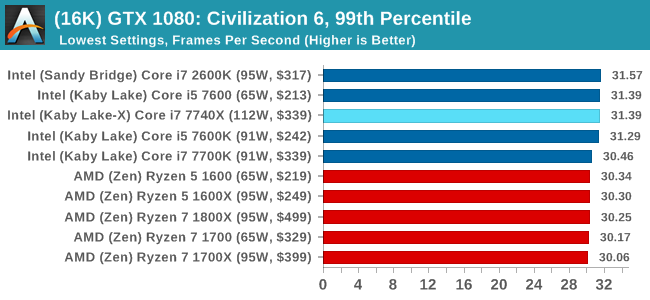
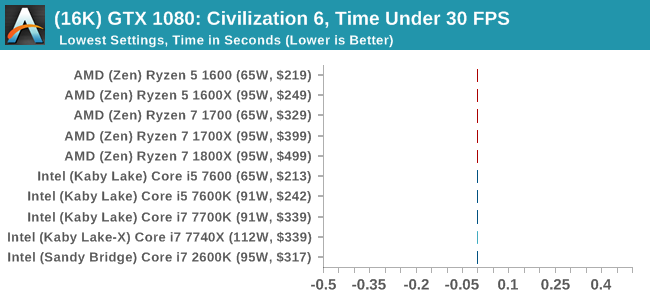
ASUS GTX 1060 Strix 6GB Performance

1080p

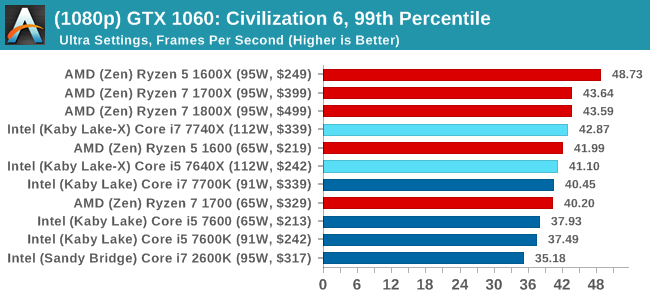
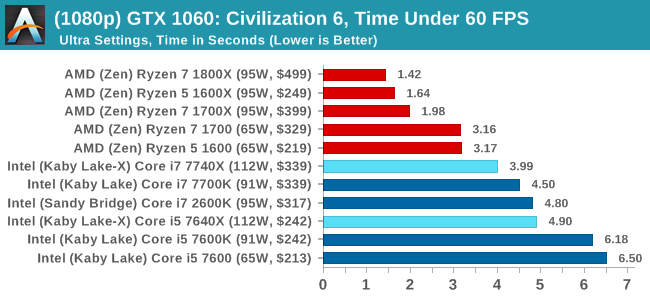
4K
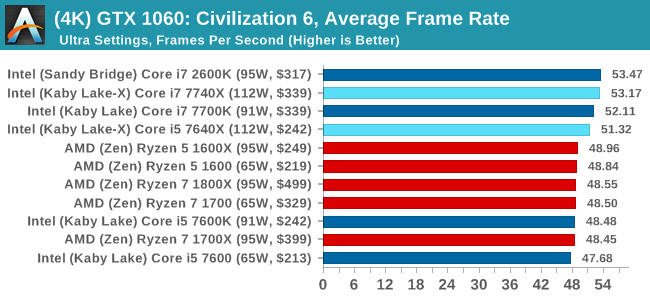
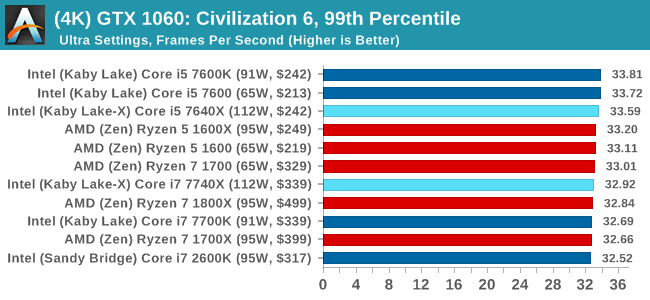
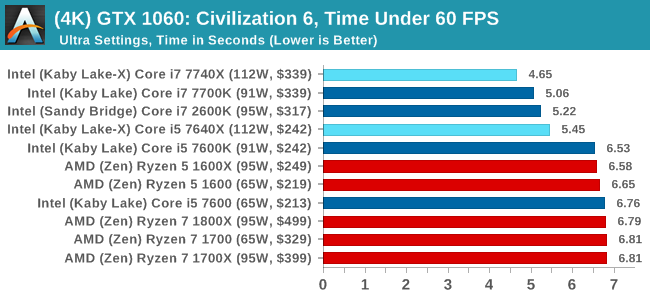
Sapphire R9 Fury 4GB Performance
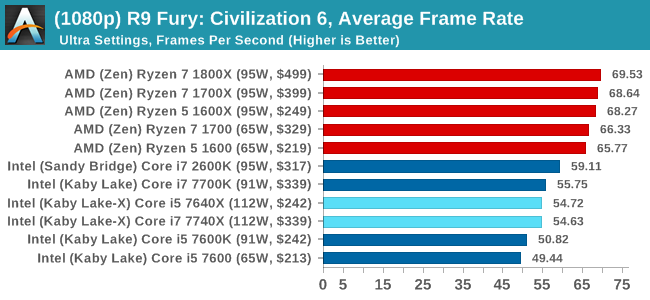
1080p

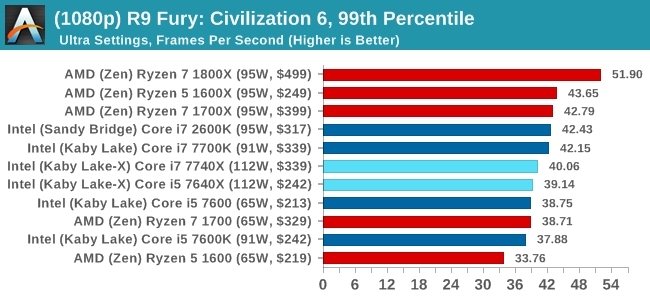
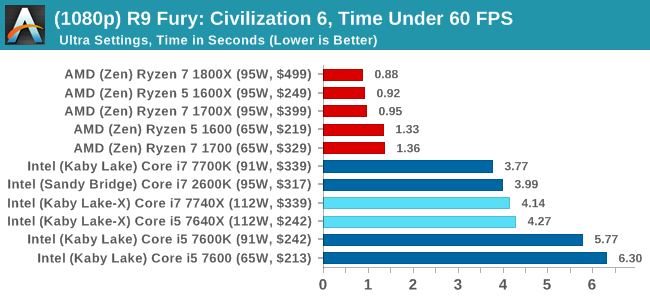
4K
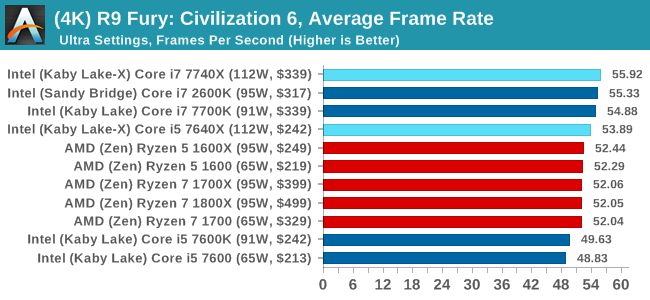
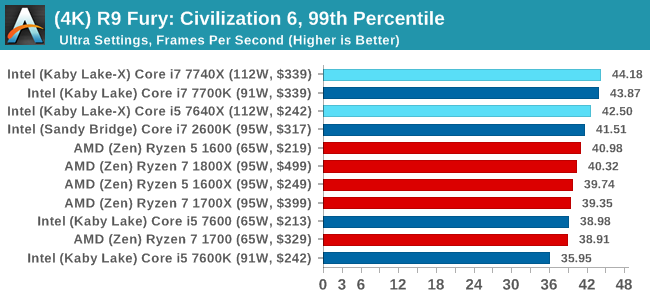
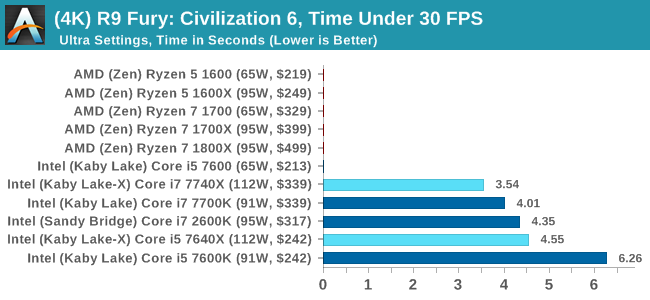
Sapphire RX 480 8GB Performance
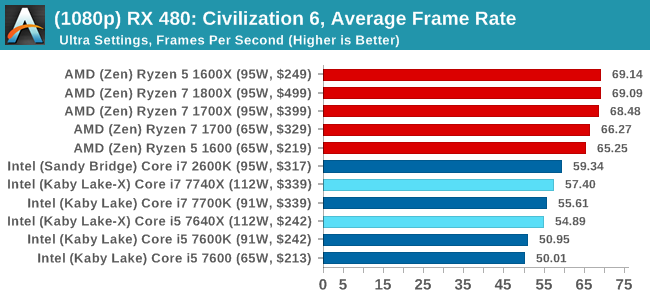
1080p

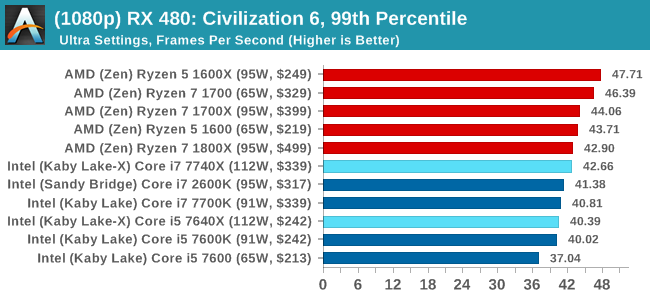
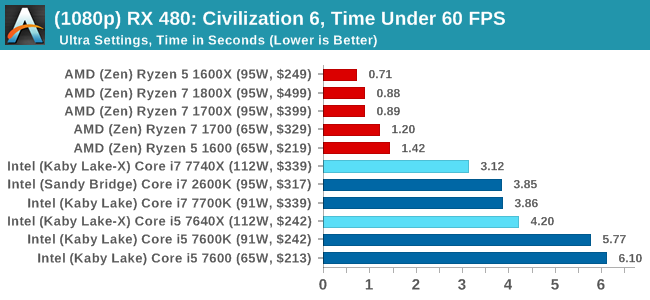
4K
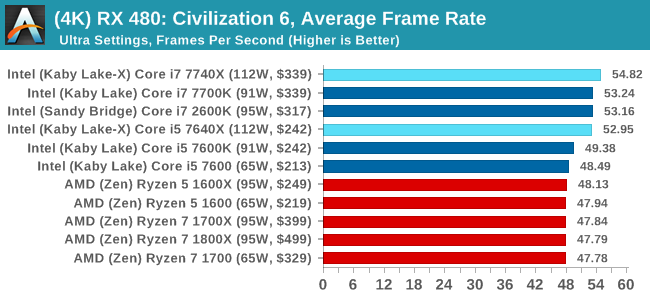
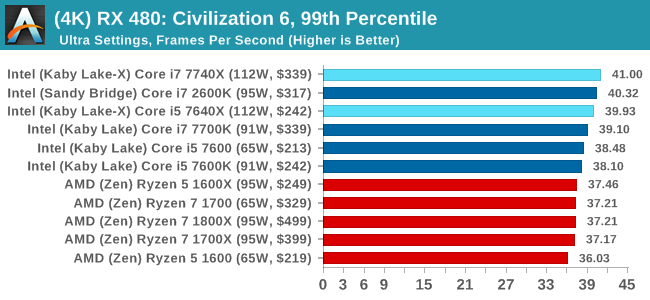
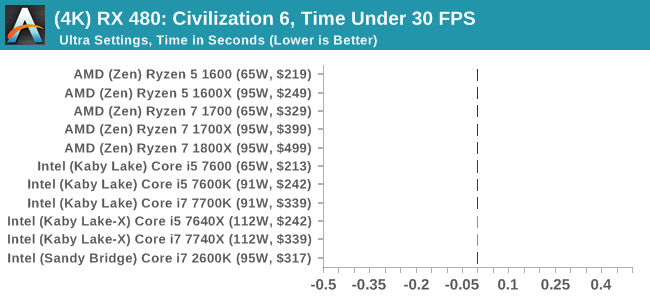
Civilization 6 Conclusion
In all our testing scenarios, AMD wins at 1080p with minor margins on the frame rates but considerable gains in the time under analysis. Intel pushes ahead in almost all of the 4K results, except with the time under analysis at 4K using an R9 Fury, perhaps indicating that AMD is offering a steadier range in its frame rate, despite the average being lower.


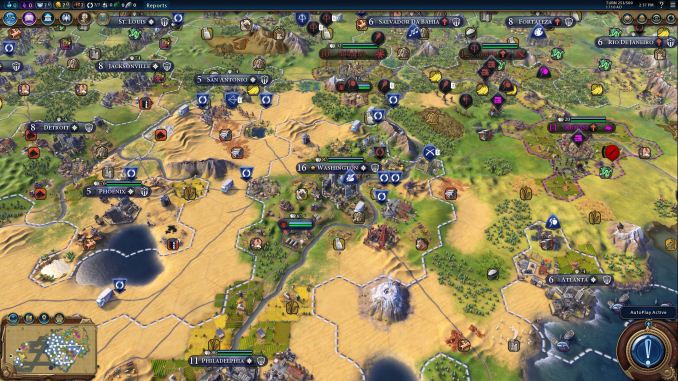
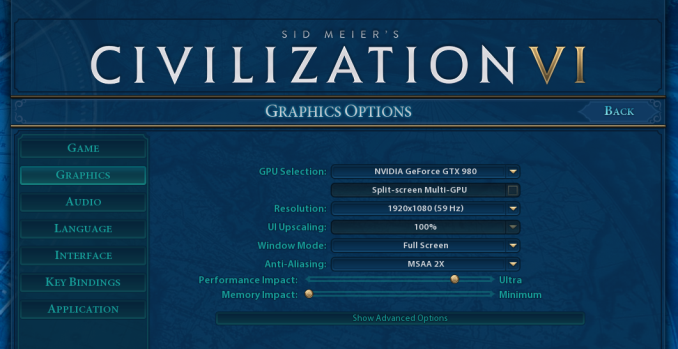








176 Comments
View All Comments
Ian Cutress - Monday, July 24, 2017 - link
*As specifically written down on that page and mentioned in the explanation for that benchmark*, GeoThermal Valley at 1080p on the GTX 1080 seems incredibly optimized: all the Core i5 chips do so much better than all the other chips.lixindiyi - Monday, July 24, 2017 - link
The frequency of Ryzen 7 1700 should be 3.0/3.7 GHz.Integr8d - Monday, July 24, 2017 - link
"After several years of iterative updates, slowly increasing core counts and increasing IPC, we have gotten used to being at least one generation of microarchitecture behind the mainstream consumer processor families. There are many reasons for this, including enterprise requirements for long support platforms as well as enterprise update cycles."You forgot 'milking their consumer, enthusiast and enterprise markets'...
Arbie - Monday, July 24, 2017 - link
Ian! You're a Brit - please help defend our common language. You meant to say "raises the question". "Begs the question" is totally different and does not even approximate what you intended.Journos: You don't have to understand "begs the question" because you'll very rarely need it. If you mean "raises the question" then just use that - plain English.
Mayank Singh - Monday, July 24, 2017 - link
Can someone explain how could the i5's could have got better performance than the i7 at 1080p?Ian Cutress - Monday, July 24, 2017 - link
Geothermal Valley on RoTR seems to be optimized for 1080p on a GTX 1080 and overly so, giving a lot more performance on that specific setup and test.Icehawk - Monday, July 24, 2017 - link
How is that possible? The i5 has slower clocks and less cache. So how can it be faster, "optimization" isn't valid here IMO unless I am missing something.I think you have a throttling issue or something else that needs to be examined. Monitoring long term clocks and temps is something that you need to look at incorporating if only to help validate results.
lucam - Monday, July 24, 2017 - link
When are you guys doing the iPad Pro review?dgz - Monday, July 24, 2017 - link
I remember a time when AT used to be a trustworthy. Who are you fulling, Ian? No one, that's who. Shame on you.Ian Cutress - Monday, July 24, 2017 - link
I've been called an AMD shill and an Intel shill in the space of two weeks. Fun, isn't it.